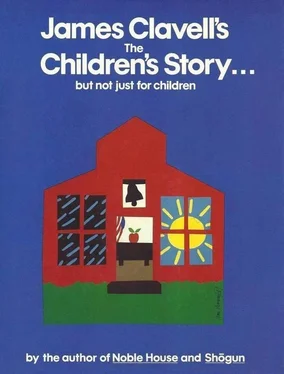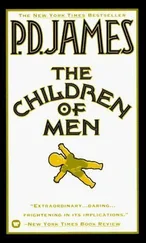James Clavell - The Children's Story
Здесь есть возможность читать онлайн «James Clavell - The Children's Story» весь текст электронной книги совершенно бесплатно (целиком полную версию без сокращений). В некоторых случаях можно слушать аудио, скачать через торрент в формате fb2 и присутствует краткое содержание. Город: New York, Год выпуска: 1981, ISBN: 1981, Издательство: Doubleday Books, Жанр: Проза, на английском языке. Описание произведения, (предисловие) а так же отзывы посетителей доступны на портале библиотеки ЛибКат.
- Название:The Children's Story
- Автор:
- Издательство:Doubleday Books
- Жанр:
- Год:1981
- Город:New York
- ISBN:978-0-385-28135-5
- Рейтинг книги:5 / 5. Голосов: 1
-
Избранное:Добавить в избранное
- Отзывы:
-
Ваша оценка:
- 100
- 1
- 2
- 3
- 4
- 5
The Children's Story: краткое содержание, описание и аннотация
Предлагаем к чтению аннотацию, описание, краткое содержание или предисловие (зависит от того, что написал сам автор книги «The Children's Story»). Если вы не нашли необходимую информацию о книге — напишите в комментариях, мы постараемся отыскать её.
The Children's Story — читать онлайн бесплатно полную книгу (весь текст) целиком
Ниже представлен текст книги, разбитый по страницам. Система сохранения места последней прочитанной страницы, позволяет с удобством читать онлайн бесплатно книгу «The Children's Story», без необходимости каждый раз заново искать на чём Вы остановились. Поставьте закладку, и сможете в любой момент перейти на страницу, на которой закончили чтение.
Интервал:
Закладка:
James Clavell
The Children’s Story
For all children
...everywhere
the teacher was afraid.
And the children were afraid. All except Johnny. He watched the classroom door with hate. He felt the hatred deep within his stomach. It gave him strength.
It was two minutes to nine.
The teacher glanced numbly from the door and stared at the flag which stood in a corner of the room. But she couldn’t see the flag today. She was blinded by her terror, not only for herself but mostly for them, her children. She had never had children of her own. She had never married.
In the mists of her mind she saw the rows upon rows of children she had taught through her years. Their faces were legion. But she could distinguish no one particular face. Only the same face which varied but slightly. Always the same age or thereabouts. Seven. Perhaps a boy, perhaps a girl. And the face always open and ready for the knowledge that she was to give. The same face staring at her, open, waiting and full of trust.
The children rustled, watching her, wondering what possessed her. They saw not the gray hair and the old eyes and the lined face and the well-worn clothes. They saw only their teacher and the twisting of her hands. Johnny looked away from the door and watched with the other children. He did not understand anything except that the teacher was afraid, and because she was afraid she was making them all worse and he wanted to shout that there was no need to fear. “Just because they’ve conquered us there’s no need for panic-fear,” Dad had said. “Don’t be afraid, Johnny. If you fear too much, you’ll be dead even though you’re alive.”
The sound of footsteps approached and then stopped. The door opened.
The children gasped. They had expected an ogre or giant or beast or witch or monster — like the outer-space monsters you think about when the lights are out and Momma and Daddy have kissed you good night and you’re frightened and you put your head under the cover and all at once you’re awake and it’s time for school. But instead of a monster, a beautiful young girl stood in the doorway. Her clothes were neat and clean, all olive green — even her shoes. But most important, she wore a lovely smile, and when she spoke, she spoke without the trace of an accent. The children found this very strange, for they were foreigners from a strange country far across the sea. They had all been told about them.
“Good morning, children, I’m your new teacher,” the New Teacher said. Then she closed the door softly and walked to the teacher’s desk, and the children in the front row felt and smelled the perfume of her — clean and fresh and young — and as she passed Sandra who sat at the end of the first row she said, “Good morning, Sandra,” and Sandra flushed deeply and wondered, aghast, with all the other children, How did she know my name? and her heart raced in her chest and made it feel tight and very heavy.
The teacher got up shakily. “I, er, I — good morning.” Her words were faltering. She, too, was trying to get over the shock. And nausea.
“Hello, Miss Worden,” the New Teacher said. “I’m taking over your class now. You are to go to the principal’s office.”
“Why? What’s going to happen to me? What’s going to happen to my children?” The words gushed from Miss Worden, and a lank piece of hair fell into her eyes. The children were agonized by the cut to her voice, and one or two of them felt on the edge of tears.
“He just wants to talk to you, Miss Worden,” the New Teacher said gently. “You really must take better care of yourself. You shouldn’t be so upset.”
Miss Worden saw the New Teacher’s smile but she wasn’t touched by its compassion. She tried to stop her knees from shaking. “Good-bye, children,” she said. The children made no reply. They were too terrified by the sound of her voice and the tears that wet her face. And because she was crying, some of the children cried, and Sandra fled to her.
The New Teacher shut the door behind Miss Worden and turned back into the room, cradling Sandra in her arms. “Children, children, there’s no need to cry!” she said. “I know. I’ll sing you a song! Listen!”
And she sat down on the floor as gracefully as an angel, Sandra in her arms, and she began to sing and the children stopped crying because Miss Worden never, never sang to them and certainly never sat on the floor, which is the best place to sit, as everyone in the class knew. They listened spellbound to the happy lilt of the New Teacher’s voice and to the strange words of a strange tongue which soared and dipped like the sea of grass that was the birthplace of the song. It was a child’s song and it soothed them, and after she had sung the first chorus the New Teacher told them the story of the song.
It was about two children who had lost their way and were all alone in the great grass prairies and were afraid, but they met a fine man riding a fine horse and the man told them that there was never a need to be afraid, for all they had to do was to watch the stars and the stars would tell them where their home was.
“For once you know the right direction, then there’s never a need to be afraid. Fear is something that comes from inside, from inside your tummies,” the New Teacher said radiantly, “and good strong children like you have to put food in your tummies. Not fear.”
The children thought about this and it seemed very sensible. The New Teacher sang the song again, and soon all the children were happy and calm once more. Except Johnny. He hated her even though he knew she was right about fear.
“Now,” said the New Teacher, “what shall we do? I know, we’ll play a game. I’ll try and guess your names!”
The children, wide-eyed, shifted in their seats. Miss Worden never did this, and often she called a child by another’s name. The New Teacher’ll never know all our names! Never! they thought. So they waited excitedly while the New Teacher turned her attention to Sandra. Oh, yes, somehow she already knew Sandra’s name, but how could she possibly know everyone’s? They waited, glad that they were going to catch out the New Teacher.
But they were not to catch her out. The New Teacher remembered every name!
Johnny put up his hand. “How’d you know our names? I mean, well, we haven’t had a roll call or anything, so how’d you know our names?”
“That’s easy, Johnny,” the New Teacher said. “You all sit in the same places every day. Each desk has one pupil. So I learned your names from a list. I had to work for three whole days to remember your names. A teacher must work very hard to be a good teacher, and so I worked for three days so that I could know each of you the first day. That’s very important, don’t you think, for a teacher to work hard?”
Johnny frowned and half-nodded and sat down and wondered why he hadn’t figured that out for himself before asking, astonished that she had worked three days just to know everyone the first day. But still he hated her.
“Johnny. Would you tell me something, please? How do you start school? I mean what do you do to begin with?”
Johnny stood reluctantly. “We first pledge allegiance and then we sing the song—”
“Yes, but that’s all after roll call,” Sandra said. “You forgot roll call.”
“Yes. You forgot roll call, Johnny,” Mary said.
“First we have roll call,” Johnny said. Then he sat down.
The New Teacher smiled. “All right. But we really don’t need roll call. I know all your names and I know everyone’s here. It’s very lazy for a teacher not to know who’s here and who isn’t, don’t you think? After all, a teacher should know. So we don’t need roll call while I’m your teacher. So we should pledge, isn’t that next?”
Читать дальшеИнтервал:
Закладка:
Похожие книги на «The Children's Story»
Представляем Вашему вниманию похожие книги на «The Children's Story» списком для выбора. Мы отобрали схожую по названию и смыслу литературу в надежде предоставить читателям больше вариантов отыскать новые, интересные, ещё непрочитанные произведения.
Обсуждение, отзывы о книге «The Children's Story» и просто собственные мнения читателей. Оставьте ваши комментарии, напишите, что Вы думаете о произведении, его смысле или главных героях. Укажите что конкретно понравилось, а что нет, и почему Вы так считаете.










